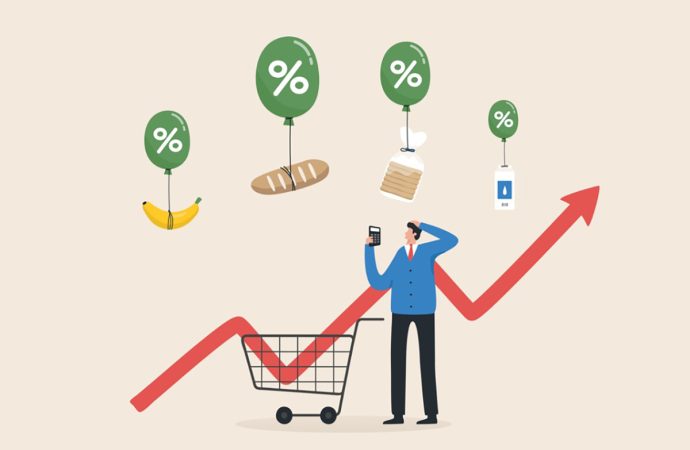Inflation is a key economic indicator that measures the rate at which prices for goods and services are rising. When inflation increases, the purchasing power of consumers decreases, as they are able to buy fewer goods and services with the same amount of money. This reduction in purchasing power can have a significant impact on
Inflation is a key economic indicator that measures the rate at which prices for goods and services are rising. When inflation increases, the purchasing power of consumers decreases, as they are able to buy fewer goods and services with the same amount of money. This reduction in purchasing power can have a significant impact on consumer spending habits.
High levels of inflation can lead to decreased consumer confidence, as consumers become more hesitant to spend their money. This can result in a decrease in overall consumer spending, which can have negative implications for businesses and the economy as a whole. When consumers are not spending as much, businesses may see a decline in sales, leading to potential layoffs and decreased economic growth.
It is important for policymakers to closely monitor inflation rates and take appropriate measures to keep inflation in check. By implementing policies that help to control inflation, such as adjusting interest rates or tightening monetary policy, governments can help to stabilize consumer spending and promote economic growth.
Shifts in Global Trade Policies

Image by : Yandex
Global trade policies play a significant role in shaping the economic landscape of countries around the world. Changes in trade policies can have a direct impact on economic growth, as they can affect the flow of goods and services between countries. Shifts in global trade policies can also impact job markets, as changes in trade agreements can lead to shifts in demand for certain industries and occupations.
It is important for countries to carefully consider the implications of changes in trade policies and to work towards creating policies that promote fair and open trade. By fostering strong trade relationships with other countries and promoting policies that support a level playing field for businesses, countries can help to stimulate economic growth and create job opportunities for their citizens.
Technological Advancements and Labor Markets
Technological advancements are rapidly reshaping labor markets around the world. Automation, artificial intelligence, and other technological innovations are changing the way that work is done, leading to shifts in the types of skills that are in demand in the labor market. These changes can have significant economic implications, as they can impact job growth, wages, and overall economic productivity.
As technology continues to advance, it is important for policymakers and businesses to adapt to these changes and to invest in training and education programs that help workers develop the skills needed to succeed in the evolving labor market. By embracing technological advancements and preparing workers for the jobs of the future, countries can help to ensure that their economies remain competitive and resilient in the face of technological change.
Monetary Policy Adjustments
Monetary policy plays a crucial role in shaping economic conditions and influencing consumer behavior. Interest rate cuts, for example, can stimulate borrowing and spending by making it cheaper for consumers and businesses to access credit. This can help to boost economic activity and promote growth.
Inflation targeting is another key aspect of monetary policy that can have significant implications for consumer prices and market expectations. By setting clear inflation targets and taking appropriate measures to achieve them, central banks can help to maintain price stability and promote confidence in the economy.
It is important for policymakers to carefully consider the implications of monetary policy adjustments and to communicate their decisions effectively to the public. By implementing sound monetary policies that support economic growth and stability, countries can help to create an environment that is conducive to investment, job creation, and overall prosperity.
Supply Chain Disruptions

Image by : Yandex
Supply chain disruptions can have a significant impact on economic implications, as they can disrupt the flow of goods and services and lead to shortages and price fluctuations. Recent changes in supply chain dynamics, such as the global pandemic, have highlighted the need for supply chain resilience and the importance of having robust contingency plans in place.
It is important for businesses to carefully assess their supply chains and to identify potential vulnerabilities that could impact their operations. By diversifying supply chains, adopting new technologies, and building strong relationships with suppliers, businesses can help to mitigate the risks associated with supply chain disruptions and ensure that they are better prepared to respond to unexpected challenges.
Real Estate Market Trends
Recent changes in the real estate market have had significant implications for the economy. The impact of these changes on economic implications can be seen in the fluctuation of housing prices, rental rates, and construction activity. Real estate market trends can also influence consumer confidence and spending habits, as housing is often a major investment for individuals and families.
It is important for policymakers to closely monitor real estate market trends and to take appropriate measures to address any imbalances or risks that may arise. By promoting policies that support a healthy and stable real estate market, governments can help to create an environment that is conducive to economic growth and prosperity.
Government Stimulus Measures
Government stimulus measures can have a direct impact on economic implications, as they can help to stimulate economic activity and support businesses and households during times of economic uncertainty. Recent changes in stimulus measures, such as fiscal stimulus packages and monetary support programs, have played a crucial role in helping to mitigate the impact of the global pandemic on the economy.
It is important for governments to carefully consider the implications of stimulus measures and to implement policies that are targeted and effective. By providing support to businesses and households that are most in need, governments can help to promote economic recovery and create a foundation for sustainable growth.
Corporate Earnings and Stock Market Volatility

Image by : Yandex
Corporate earnings play a key role in shaping economic implications, as they can impact investor confidence, stock market performance, and overall economic stability. When corporate earnings are strong, investors are more likely to invest in the stock market, leading to higher stock prices and increased economic activity. Stock market volatility can also influence economic implications, as fluctuations in stock prices can impact consumer confidence and spending habits. It is important for policymakers to closely monitor stock market trends and to implement policies that help to promote stability and confidence in the financial markets.
















